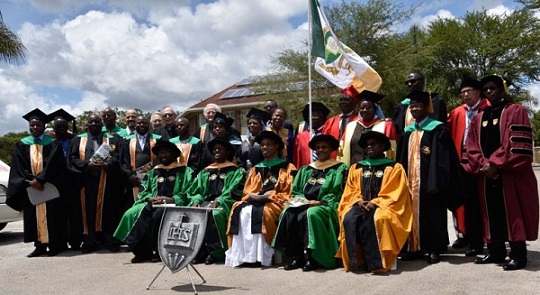- Contact us on - Contactez-nous sur - Contacte-nos em
- +233-30-277-8867/8
- +233-30-277-2548
- secam@secam.org
From College to University: The Audacity of African Jesuits
From College to University: The Audacity of African Jesuits
Spotlight Africa || By Ricardo da Silva, SJ || 26 February 2018
 On Saturday, 24 February 2018, the Jesuits in Africa opened their second university on the continent in Harare, Zimbabwe. For 24 years Arrupe College has been the English-medium philosophate for Jesuits in Africa. The college has now become a university. Ricardo da Silva was at the inauguration and offers an eye-witness account of the events as well as the road that the fledgeling university has travelled to get where it is today.
On Saturday, 24 February 2018, the Jesuits in Africa opened their second university on the continent in Harare, Zimbabwe. For 24 years Arrupe College has been the English-medium philosophate for Jesuits in Africa. The college has now become a university. Ricardo da Silva was at the inauguration and offers an eye-witness account of the events as well as the road that the fledgeling university has travelled to get where it is today.
It is not every day that one witnesses the inauguration of a university; let alone in Africa where higher education is still very much for the privileged few and seems to be under assault at each turn: from fees crises and serious mismanagement of funds to fraudulent awards of degrees. This did not deter the Jesuits – who did precisely that – when, this past Saturday, they launched their second university on the continent, Arrupe Jesuit University (AJU). They showed themselves courageous enough to swim upstream heeding the call given to them by Dominican Master General, Fr Bruno Cadoré, when he addressed the Jesuits at the last General Congregation in October 2016 in Rome. Cadoré told the Society of Jesus to “dare the audacity of the improbable“. Later, at the same gathering of Jesuit representatives from all over the world, Pope Francis added to this by calling his brother Jesuits to “prophetic audacity“.
What is now known as AJU started life in very humble beginnings 24 years ago, operating from a disused wing in St Anne’s hospital, run by the Little Company of Mary, a congregation of Catholic Religious sisters. Arrupe College (AC), as it was known, afforded young African Jesuits the opportunity to do studies in philosophy and the humanities (literature, history, education and African studies) on the continent. From St Anne’s AC managed to secure a large plot of land in Mount Pleasant, Harare, where it is located today. Although the primary group of students have been Jesuits, the college was open to all from its inception. Men and women, religious and lay, were admitted without discrimination.
The college awarded degrees as an associate college of the Gregorian University in Rome. In 1998 it was recognised as an associate college of the historically well-respected University of Zimbabwe under the guidance, mentorship and rigorous inspections of the Faculty of Religious Studies, Classics and Philosophy (RSCP). Over the years the college led by its trustees, the Society of Jesus, has given thought to and had discussions that would open the way to the institution’s autonomy. It was, however, only in the past few years, that this seemed feasible. Given the ever-changing and demanding nature of the higher education landscape, it became clear that AC had both a need and a real opportunity to apply for this new status.
Following its application to the Zimbabwe Council for Higher Education (ZIMCHE), and after a rigorous inspection and vetting process – at times most ‘unfriendly’, as the CEO of ZIMCHE, Prof Emmanuel Ngara related in his address at the inauguration – AJU was born when a letter arrived on 7 December 2017, confirming its upgraded to ‘university’ status. The registration was awarded provisionally for one year after which the university will be assessed again to confirm its status as an autonomous degree awarding institution of higher learning.
AJU will open its doors with a humble offering: initially maintaining a single Faculty of Arts in which they will faithfully and proudly keep to their legacy of excellence in the study of philosophy and the humanities. AJU will offer 4-year honours degrees in philosophy, literature, and in the new training for transformation programme which is done in partnership with The Grail Centre in Kleinmond, South Africa.
AJU has already announced its desire to lead with its imminent expansion into the realm of information and communications technology (ICT) education. It will open applications for an honours degree in the sciences with its BSc (Hons) ICT soon. This will be done in collaboration with The ICT University in Louisiana, USA.
In addition, postgraduate students can register for master’s degrees in literature, philosophy, education, theology, university administration and early childhood development. AJU already has its first intake of doctoral students in philosophy.
The University is led by an all Jesuit African team. The Chancellor is the president of the conference of Jesuit Superiors of Africa and Madagascar (JESAM), Fr Agbonkhianmeghe Orobator, who has delegated the day to day running of AJU to Vice Chancellor, Fr Kizito Kiyimba, a Ugandan by birth, and graduate of the doctoral programme in philosophy of science from the world-renowned London School of Economics and Political Science (LSE). On the executive team are two Pro-Vice Chancellors: Tanzanian, Fr Gilbert Mardai, who is responsible for administration, finance and development; and Nigerian, Fr Evaristus Ekwueme, who is in charge of academics.
The Jesuits will now have to prove their mettle and roll up their sleeves to ensure the continuing status of AJU so that they reach their mission objective: to become serious players in the higher education space in Africa and to uphold the widely acclaimed standard of Jesuit higher education the world over.
Writing in AJU’s souvenir publication, Chancellor, Fr Orobator, made it clear that though the university will pursue academic excellence in all spheres, it does this with a clear mission to seriously contribute to Africa’s development agenda.
Orobator said at the inauguration:
I thank and congratulate you all. But this is not a time for complacency. The hard work of securing a new status has ended; now begins the harder work of making Arrupe Jesuit University a reality.
To be a university is not merely a thing of pride; it comes with a weighty responsibility. AJU takes its place on a continent where 17 million of 128 million school-aged children will never see the inside walls of a school, and 12 million youth enter the job market annually to compete for 3 million jobs, while half of the 10 million students who graduate annually are unemployed (Source: African Development Bank and International Labour Organization).
For a continent of 1.2 billion people and 54 countries, the contribution of AJU would seem a negligible fraction. Yet it is important to make a difference in the context of our existence as a higher education institution to the lives of women and men. To achieve this objective every member of the AJU family must aspire in excellence to leadership in conscience, compassion, competence and commitment.
Considering the privileged nature of access to higher education, a university – besides discovering, producing and imparting knowledge and understanding – must necessarily be concerned about serving the needs of the poor. The painful and disturbing reality of widespread poverty is both a catalyst for and a challenge to the development of higher education in Africa. As members of the AJU family, we are tasked with devising creative and innovative approaches to this challenge, including the education of a society that values fairness, equity and justice; and undertaking a mission to create just and equitable socio-economic and political conditions for the marginalized and underprivileged to flourish in freedom and dignity.
As pioneers of AJU, it is everyone’s duty to make AJU a catalyst for integral human development and social transformation in Africa and beyond. One hundred years from now, posterity will judge us on how well we assumed and discharged this noble task. Congratulations and God bless!” SA.
Source: Spotlight Africa…

